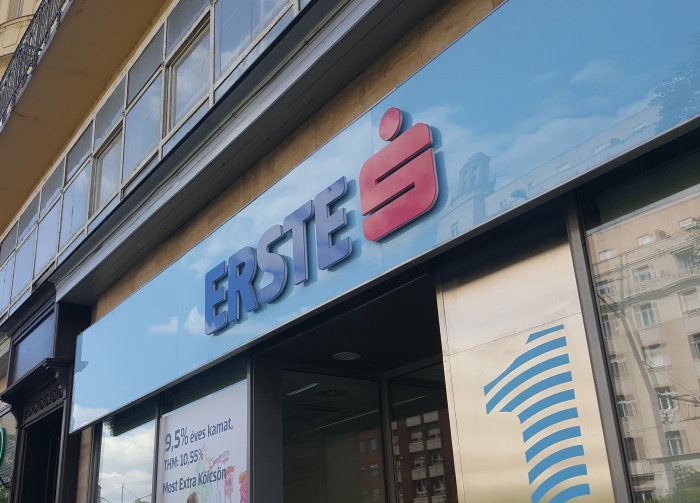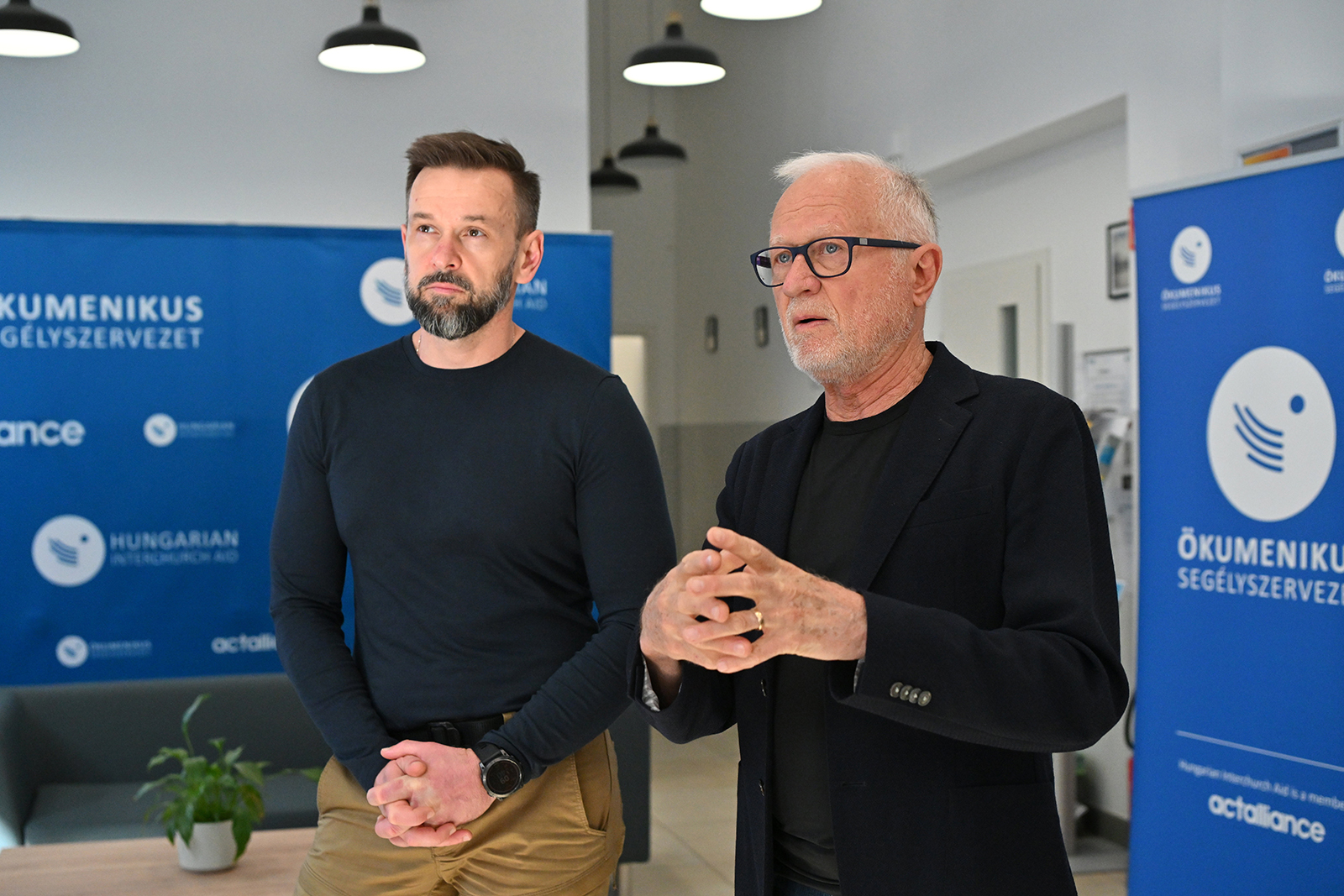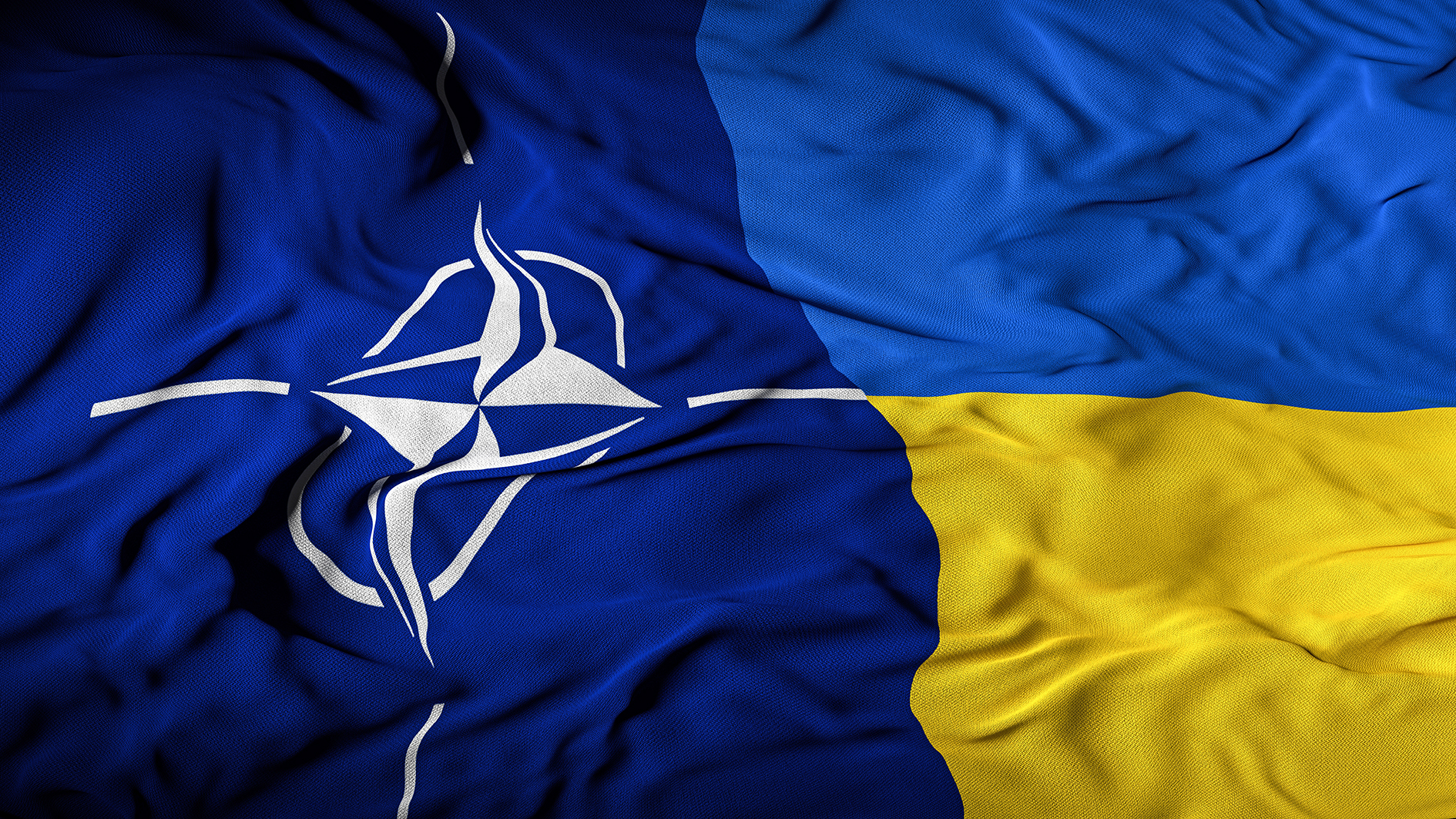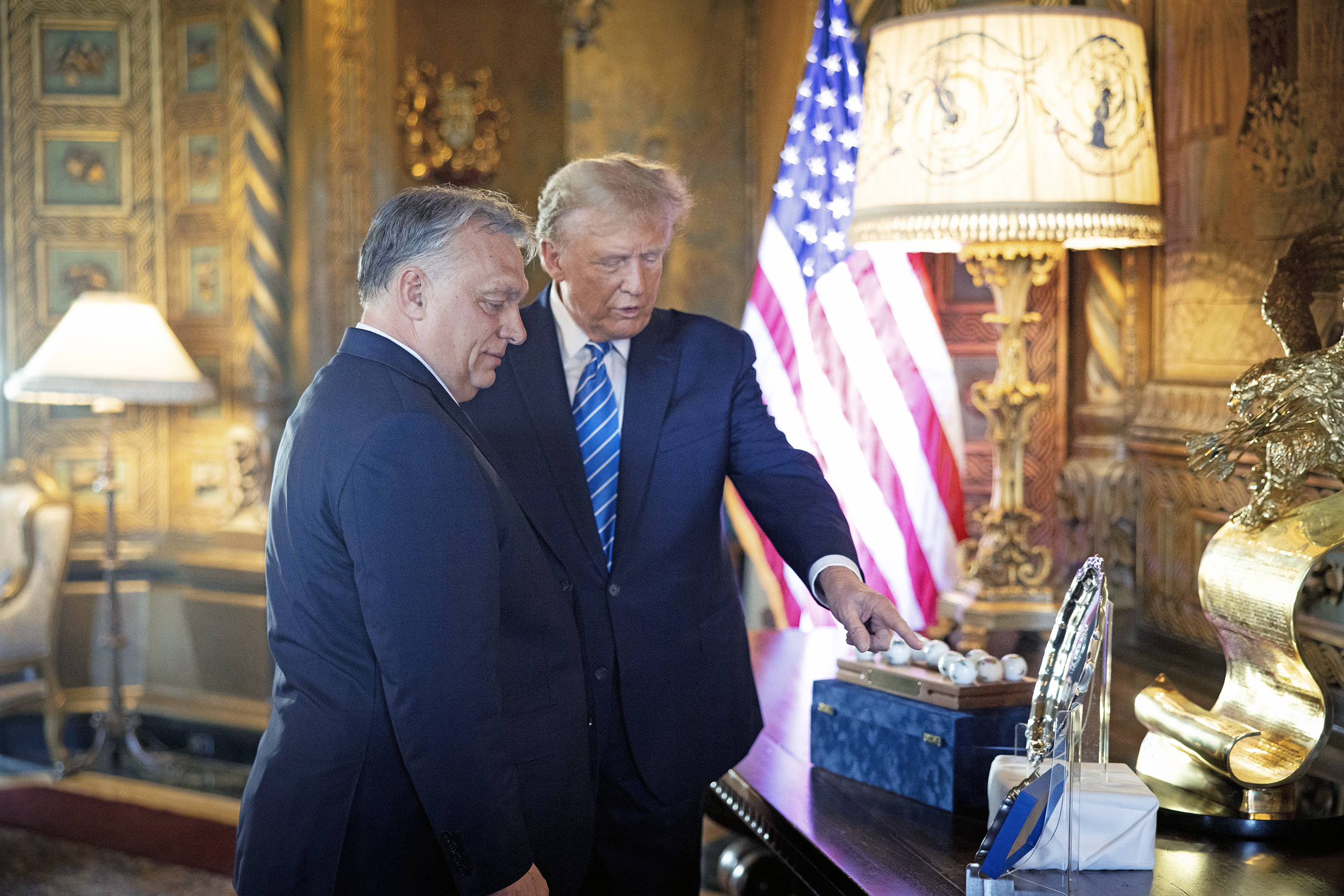Orbán Makes New Year Offer on his Ukraine Funding Veto
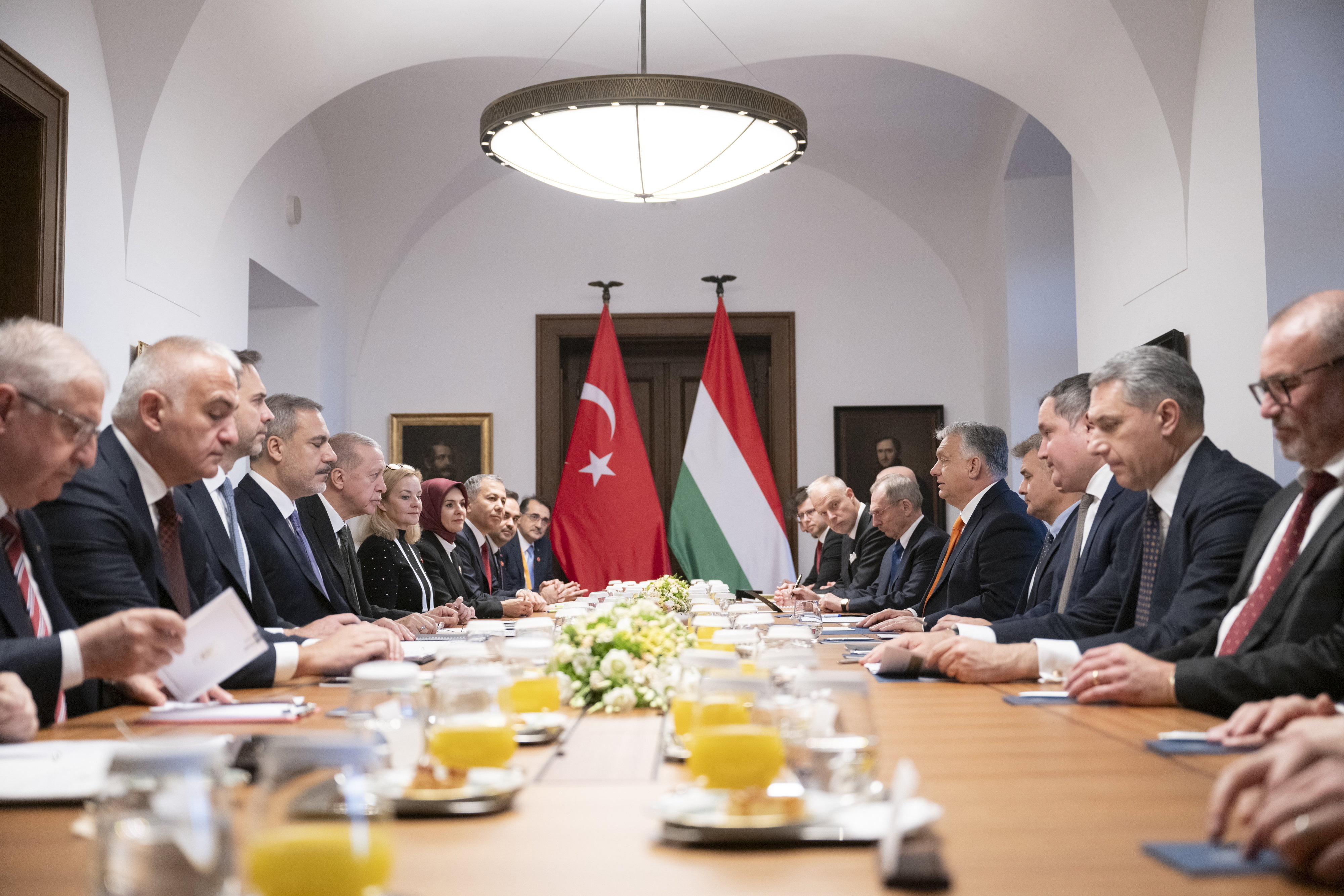
In this photo released by the Press Office of the Prime Minister, Prime Minister Viktor Orbán (center right) and Turkish President Recep Tayyip Erdogan (center left) are seen during a plenary session at the Carmelite Monastery on Dec. 18, 2023. Alongside Orbán, working from nearest the camera, are ministers Csaba Lantos (energy), János Lázár (construction and transport), Márton Nagy (economic development), Sándor Pintér (interior), Kristóf Szalay-Bobrovniczky (defense) and János Bóka (EU affairs). Hungary and Turkey are still the only holdouts to Sweden’s application to join NATO in the wake of Russia’s invasion of Ukraine.
Photo by Vivien Cher Benko / Prime Minister’s Press Office / MTI.
Hungary may be willing to lift its veto on EUR 50 billion in European Union financial aid to Ukraine if the European Council were open to approving portions of the funding on an annual basis, Prime Minister Viktor Orbán indicated in a proposal submitted during an ad hoc working party on the EU’s Multiannual Financial Framework on Jan. 5, according to a report from Politico.
The move would involve disbursing the EUR 50 bln aid package in increments of EUR 12.5 bln (USD 13.7 bln) over the course of four years, pending unanimous yearly approval. While, practically, this would mean that Orbán could feasibly block the EU funding each year in order to gain concessions from Brussels for withholding his veto, it also indicates that pressure on Orbán to accept the aid package by the coming EU summit on Feb. 1 could be coming to bear.
At the previous summit on Dec. 14-15, Orbán was the sole EU leader to withhold his approval for the funding, which requires unanimous agreement to pass, despite suggesting a day earlier that he might be open to compromise following an EU concession. On Dec. 13, the EU decided to release more than EUR 10 bln in funds to Hungary, roughly one-third of the money it has withheld over rule-of-law and graft concerns.
While the European Commission said in a statement that it released the funds because of its satisfaction with laws Orbán’s government had passed to strengthen judicial independence, the Prime Minister had insisted on Hungary receiving its own funding before he would consider backing support for Ukraine.
Financial, Strategic or Policy
“I’m ready to make a financial deal on financial issues,” Orbán told the Mandiner weekly podcast the same day. “But I’m not ready to make a financial deal on strategic or policy issues,” he said, suggesting he would torpedo Ukraine’s efforts at opening accession talks with the EU.
In fact, he did just the opposite. Although Orbán followed through with blocking the financial aid package for Ukraine, he tacitly allowed the EU to start membership negotiations with Ukraine by effectively abstaining. Following three hours of deadlock, Politico reported that German Chancellor Olaf Scholz had suggested to Orbán, among his EU counterparts, that if he really wasn’t open to compromise, he should consider briefly leaving the room. This solution would enable the other 26 member states in agreement to approve opening accession talks, while Orbán could still say he had not voted in favor, as according to EU rules, unanimity can still be fulfilled if one leader is absent.
Relating his own experience of the “long and difficult” debate over the course of eight hours, Orbán told Kossuth Rádió on Dec. 15 he had tried to convince his counterparts that Ukraine was “unprepared to become an EU member,” but “they couldn’t be persuaded. I tried to explain that helping badly is worse than not helping at all,” he added. Orbán said that by leaving the room, Hungary did not block the decision but would bear no responsibility for it, emphasizing that the “bad decision” would “not weigh on Hungary’s conscience.”
Yet, some EU officials are said to be growing fed up with Orbán’s obstructionism and are considering invoking Article 7 of the EU Treaty against Hungary, which could lead to the suspension of its voting rights, according to a report from the Financial Times. Although any single EU member state could veto this process, Hungary “no longer has a guaranteed protector,” as erstwhile ally Poland recently elected its liberal opposition to power, bringing it more in line with EU orthodoxy. However, many within the bloc remain apprehensive about wielding “the EU’s biggest weapon against a member state” and would still prefer to persuade Orbán to cooperate voluntarily or to seek alternative means of providing support to Ukraine without Hungary.
This article was first published in the Budapest Business Journal print issue of January 12, 2024.
SUPPORT THE BUDAPEST BUSINESS JOURNAL
Producing journalism that is worthy of the name is a costly business. For 27 years, the publishers, editors and reporters of the Budapest Business Journal have striven to bring you business news that works, information that you can trust, that is factual, accurate and presented without fear or favor.
Newspaper organizations across the globe have struggled to find a business model that allows them to continue to excel, without compromising their ability to perform. Most recently, some have experimented with the idea of involving their most important stakeholders, their readers.
We would like to offer that same opportunity to our readers. We would like to invite you to help us deliver the quality business journalism you require. Hit our Support the BBJ button and you can choose the how much and how often you send us your contributions.


